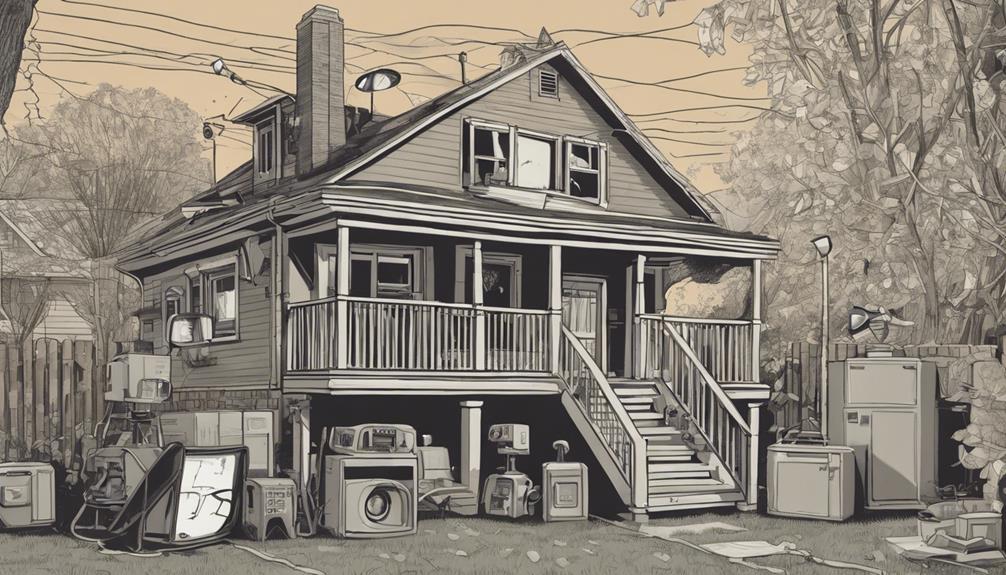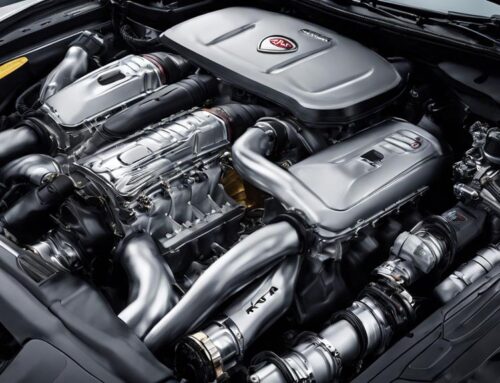Keeping a home security system running involves costs that extend beyond the initial installation fees. You'll have to budget for monthly monitoring fees, which guarantee 24/7 protection and emergency response. Regular maintenance of cameras, sensors, and alarms is essential to avoid unexpected breakdowns. Don't forget about software and firmware updates to secure your system against new threats. Upgrading your system with smart locks or advanced cameras can also add to expenses, but they boost safety. Explore the nuances of these costs and upgrades to understand the full financial commitment of maintaining a robust home security system.
Key Takeaways
- Monthly monitoring fees ensure continuous surveillance but significantly add to long-term expenses.
- Routine equipment maintenance and proactive battery replacement prevent costly unexpected failures.
- Regular software and firmware updates are essential to avoid security vulnerabilities and inefficiencies.
- System upgrades and add-ons, like smart locks and advanced cameras, increase overall protection but incur additional costs.
- Professional installation fees vary by system complexity and can impact long-term financial planning.
Initial Installation Fees
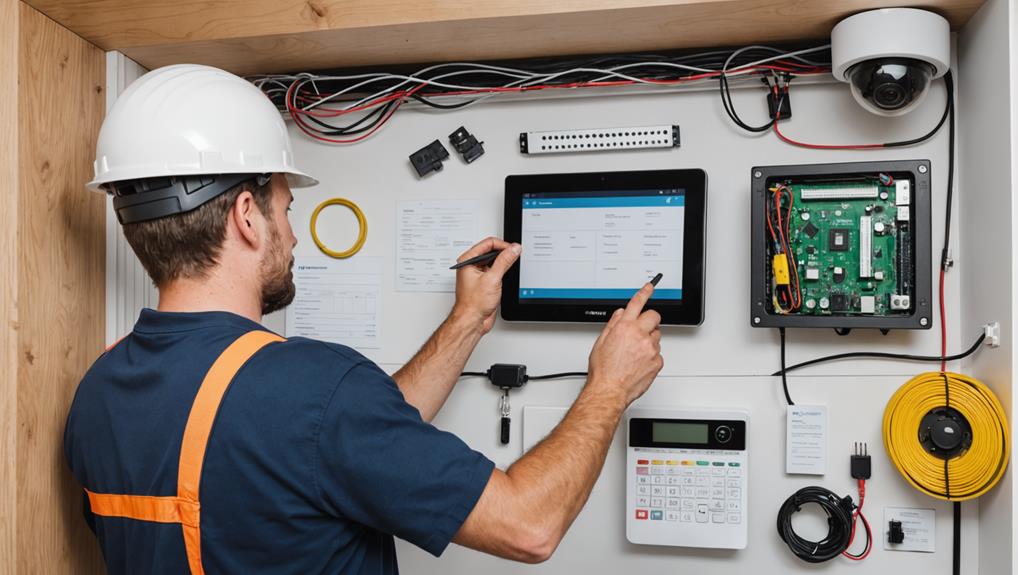
When you first consider setting up a home security system, one of the primary costs you'll encounter is the initial installation fee. This fee covers the professional installation of security cameras, sensors, alarms, and control panels.
It's an important expenditure to guarantee that your system operates efficiently and effectively right from the start. In addition, choosing between a wireless or wired system can also impact the initial costs and complexity of the installation.
If you're someone who values serving others, investing in a robust security setup can provide peace of mind not just for you but for anyone who visits or stays in your home.
Initial installation fees can vary widely depending on the complexity and scale of the system you're installing. For a basic setup, the costs might be relatively low, but more advanced systems with numerous components and smart home integration can be more expensive.
It's vital to get a detailed quote from a reputable security company to understand exactly what services are included in the fee.
Monthly Monitoring Costs
Monthly monitoring costs are an important factor when maintaining a home security system. You want to guarantee your home is protected, and monitoring fees play a significant role in that protection. These fees cover the constant surveillance of your home, giving you peace of mind that someone is always watching over your property, ready to respond to any alerts.
The initial setup and equipment costs are also elements to take into account when evaluating the overall expenses of a home security system.
When you choose a monitoring plan, you're investing in more than just technology—you're investing in the safety and well-being of your loved ones. Different providers offer various packages, so it's essential to compare their services.
Some plans may include 24/7 professional monitoring, emergency response coordination, and even mobile app access. These services can vary in cost, so finding a plan that fits your budget while meeting your security needs is crucial.
Equipment Maintenance
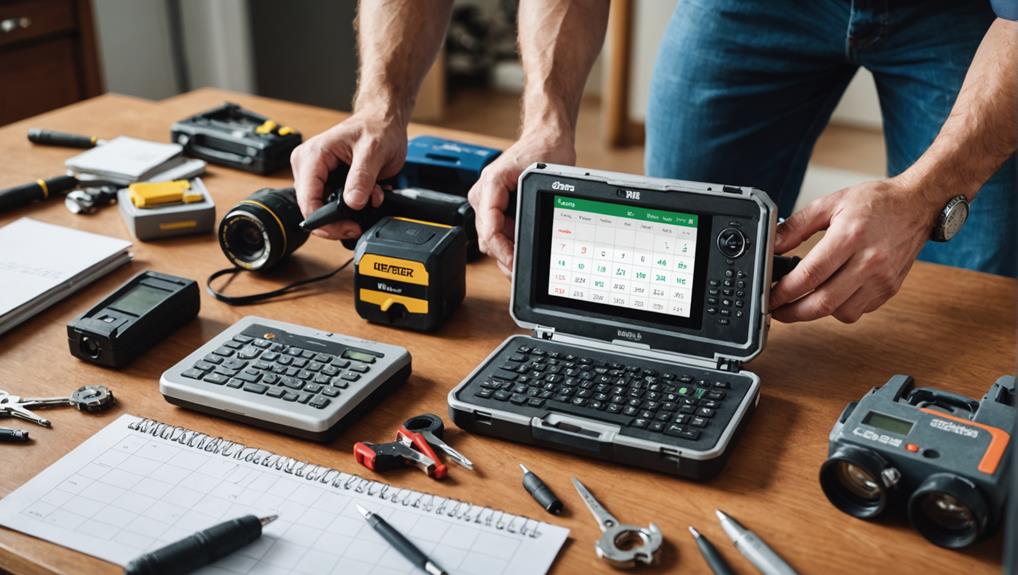
Regular equipment maintenance is vital for guaranteeing your home security system operates effectively. By committing to routine security system maintenance, you're not just safeguarding your property, but also taking care of those you love and cherish.
Following best practices can greatly enhance the reliability of your system. Regular checks on cameras, sensors, and alarms can prevent unexpected failures when you need them most.
First, inspect all visible components for any wear or damage. It's important to clean camera lenses and motion sensors regularly to make certain they function at their best. Dust and debris can obstruct their view, reducing their effectiveness.
Testing alarms periodically ensures they're loud and clear, ready to alert you in an emergency.
Next, replace batteries in wireless components as per the manufacturer's recommendations. Don't wait until they're completely drained; proactive replacement keeps your system running smoothly.
Check for loose wires or connections, as these can cause malfunctions.
Software and Firmware Updates
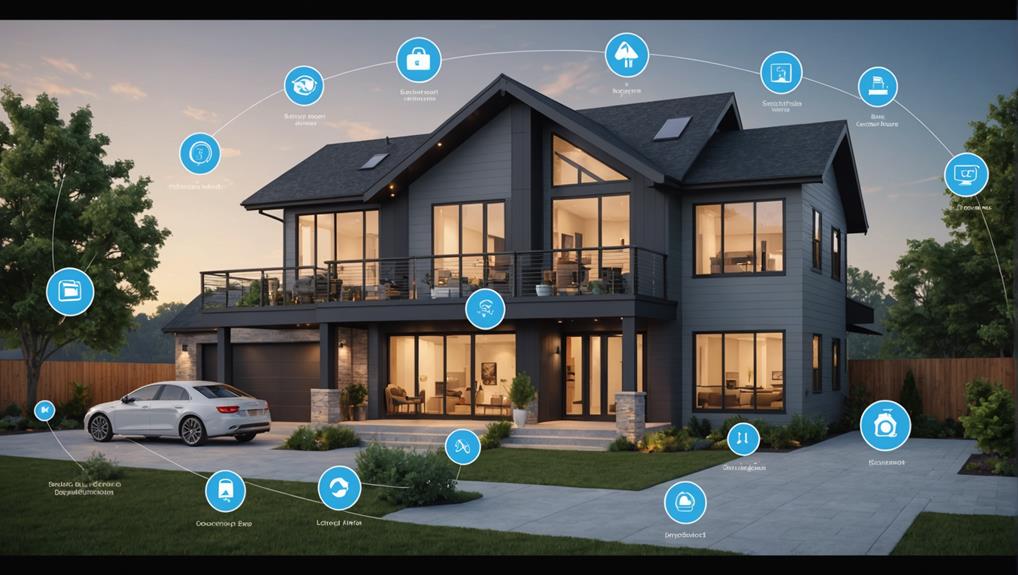
Keeping your home security system's software and firmware up-to-date is essential for its best performance and protection against vulnerabilities. Regular updates guarantee that your system can fend off the latest threats and operate efficiently. Skipping these updates can leave your home exposed to new security risks, which could compromise your peace of mind and the safety of those you care for.
According to initial setup and long-term expenses, ignoring these updates can also lead to increased costs over time.
You'll find that manufacturers frequently release equipment updates to enhance features, fix bugs, and improve overall stability. These updates are usually straightforward to install, but you need to stay vigilant and proactive. Ignoring them can lead to a less effective system, potentially jeopardizing the security you've worked hard to establish for your loved ones.
Remember, keeping your system updated isn't just about technology; it's about service to others. By guaranteeing your software and firmware are current, you're safeguarding not just your property, but also the well-being of your family and neighbors.
Plus, staying updated can help you avoid costly repairs or replacements down the line.
System Upgrades and Add-Ons
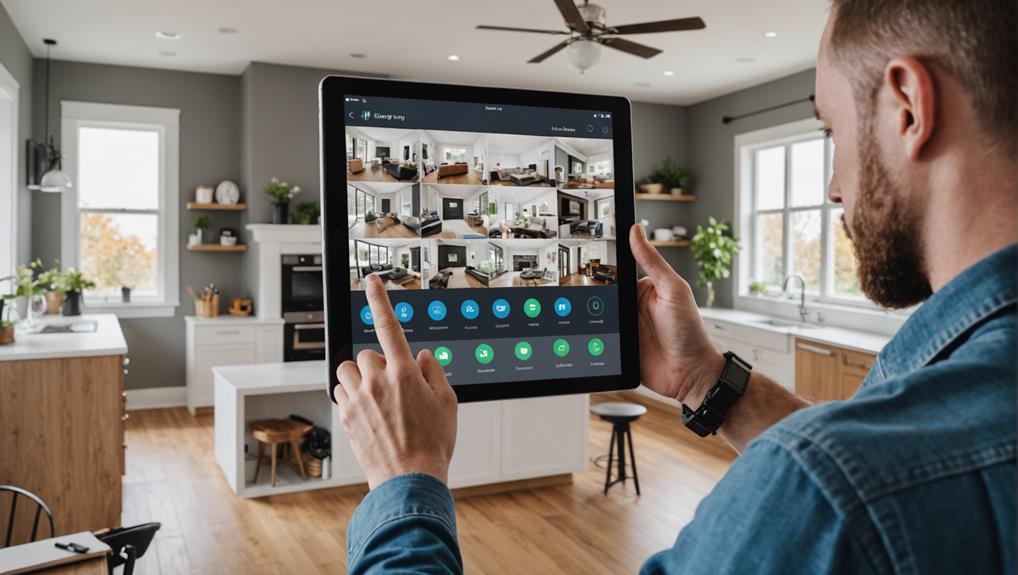
When it comes to enhancing your home security system, exploring system upgrades and add-ons can greatly bolster your overall protection. Upgrading your system guarantees you stay ahead of potential threats and adapt to new security technologies.
For instance, you might consider adding smart locks, which allow you to monitor and control entry points from your smartphone. This can be particularly useful if you're often away from home and want to guarantee your family remains safe. By integrating smart home technology, you can seamlessly combine traditional alarms with modern conveniences, further enhancing your security setup.
Another beneficial add-on is integrating security cameras with advanced features like facial recognition or motion detection. These cameras not only deter intruders but also provide essential evidence in case of an incident.
Additionally, reinforcing your system with environmental sensors, such as smoke or carbon monoxide detectors, can safeguard your loved ones from non-criminal hazards.
While system upgrades and add-ons might initially seem like extra expenses, they're investments in peace of mind and enhanced safety. By staying proactive with these enhancements, you're not just protecting your home but also serving those who matter most to you.
Frequently Asked Questions
How Do Home Insurance Premiums Change With a Security System?
When you install a home security system, your home insurance premiums usually go down.
Insurers see your home as less risky, so they often offer discounts. You're providing a safer environment, which not only protects your family but also helps others feel secure.
It's a win-win situation: you save money, and your neighborhood becomes a safer place.
Plus, you're contributing to a community that values safety and well-being.
Are There Tax Incentives for Installing a Home Security System?
Yes, there are tax incentives for installing a home security system.
By guaranteeing your home is secure, not only are you protecting your family, but you're also potentially qualifying for tax deductions.
This can be particularly beneficial if you have a home office or run a business from home.
Always consult with a tax professional to maximize these benefits and confirm you're complying with the latest regulations.
How Does a Security System Affect Property Resale Value?
A security system can greatly boost your property's resale value.
When buyers see a home equipped with a reliable security system, they're more likely to feel safe and secure. This added peace of mind can make your home more attractive, potentially leading to a quicker sale and even a higher selling price.
Plus, you'll be serving future homeowners by providing them a ready-made solution to protect their families.
What Are Common Contract Terms for Security System Services?
When considering a security system, you'll often find contracts that include a minimum service term, usually around 36 months.
They'll outline monthly monitoring fees, equipment costs, and any additional services like maintenance or upgrades.
Look for clauses about early termination fees and automatic renewals.
Understanding these terms guarantees you can serve your clients better by providing clear, honest advice about their security investments.
Can Home Security Systems Integrate With Smart Home Devices?
Home security systems can definitely integrate with smart home devices, creating a more cohesive and efficient environment.
You can connect cameras, smart locks, and lighting systems, allowing you to monitor and control everything from one app.
This integration helps you respond quickly to any issues, ensuring the safety and well-being of those you care about.
Serving others effectively means staying informed about these technologies and leveraging them for enhanced security and convenience.
Conclusion
In the long run, maintaining a home security system involves more than just the initial installation fees. You'll need to budget for monthly monitoring costs, regular equipment maintenance, and necessary software updates. Don't forget about potential system upgrades and add-ons to keep everything up-to-date. While these expenses can add up, the peace of mind and protection you gain make it a worthwhile investment. Stay proactive, and your home will remain secure and reliable for years to come.

